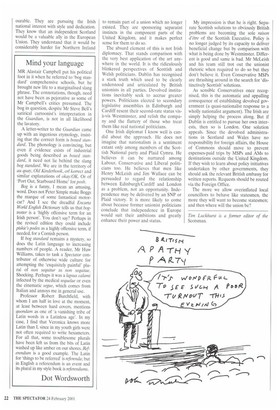Mind your language
MR Alastair Campbell put his political foot in it when he referred to 'bog standard' comprehensive schools, but he brought new life to a marginalised slang phrase. The connotations, though, need not have been as pejorative as some of Mr Campbell's critics presumed. The bog in question, despite Mr Steve Bell's satirical cartoonist's interpretation in the Guardian, is not in all likelihood the lavatory.
A letter-writer to the Guardian came up with an ingenious etymology, insisting that the correct form is boxed standard. The phonology is convincing, but even if evidence exists of industrial goods being described as boxed standard, it need not lie behind the slang bog standard. We are in the territory of au quay, Old Kinderhook, on korrect and similar explanations of okay/OK. Or of 'Port Out, Starboard Home' for posh.
Bog is a funny, I mean an amusing, word. Does not Peter Simple make Boggs the marque of some fantastical motorcar? And I see the dreadful Encarta World English Dictionary tells us that bogtrotter is a 'highly offensive term for an Irish person'. You don't say? Perhaps in the revised edition they could include piskie's podex as a highly offensive term, if needed, for a Cornish person.
If bog standard remains a mystery, so does the Latin language to increasing numbers of people. A reader, Mr Huw Williams, takes to task a Spectator contributor of otherwise wide culture for attempting the 'exquisitely painful' plural of non sequitur as non sequitae. Shocking. Perhaps it was a lapsus calami infected by the medical sequelae or even the cinematic segue, which comes from Italian and annoys me in general use.
Professor Robert Burchfield, with whom I am half in love at the moment, at least between hard covers, mentions quondam as one of 'a vanishing tribe of Latin words in a Latinless age'. In my case, I find that Veronica knows more Latin than I, since in my youth girls were not often required to write hexameters. For all that, some troublesome plurals have been left us from the bits of Latin washed up like amber on our shores. Referendum is a good example. The Latin for 'things to be referred' is referenda; but in English a referendum is an event and its plural in my style book is referendums.
Dot Wordsworth


































































 Previous page
Previous page